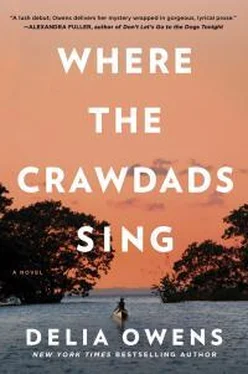“He used to come around quite a bit, fish with me. He was always showing you insects and stuff.”
“Why don’t I remember that?”
“You were very young. One afternoon Tate boated into our lagoon, where Pa was pulling on his poke, really drunk. You were wading and Pa was supposed to be watching you. Suddenly, for no reason at all, Pa grabbed you by your arms and shook you so hard your head was thrown back. Then he dropped you in the mud and started laughing. Tate jumped out of the boat and ran up to you. He was only seven or eight years old, but he shouted at Pa. Of course, Pa smacked him and screamed at him to get off his land, never come back or he’d shoot him. By this time we’d all run down to see what was happening. Even with Pa ranting and raving, Tate picked you up and handed you to Ma. He made sure you were all right before he left. We still went fishing some after that, but he never came back to our place again.”
Not until he led me home that first time I took the boat into the marsh , Kya thought. She looked at the painting—so pastel, so peaceful. Somehow Ma’s mind had pulled beauty from lunacy. Anyone looking at these portraits would think they portrayed the happiest of families, living on a seashore, playing in sunshine.
Jodie and Kya sat on the rim of the truck bed, still looking quietly at the paintings.
He continued. “Ma was isolated and alone. Under those circumstances people behave differently.”
Kya made a soft groan. “Please don’t talk to me about isolation. No one has to tell me how it changes a person. I have lived it. I am isolation,” Kya whispered with a slight edge. “I forgive Ma for leaving. But I don’t understand why she didn’t come back—why she abandoned me. You probably don’t remember, but after she walked away, you told me that a she-fox will sometimes leave her kits if she’s starving or under some other extreme stress. The kits die—as they probably would have anyway—but the vixen lives to breed again when conditions are better, when she can raise a new litter to maturity.
“I’ve read a lot about this since. In nature—out yonder where the crawdads sing—these ruthless-seeming behaviors actually increase the mother’s number of young over her lifetime, and thus her genes for abandoning offspring in times of stress are passed on to the next generation. And on and on. It happens in humans, too. Some behaviors that seem harsh to us now ensured the survival of early man in whatever swamp he was in at the time. Without them, we wouldn’t be here. We still store those instincts in our genes, and they express themselves when certain circumstances prevail. Some parts of us will always be what we were, what we had to be to survive—way back yonder.
“Maybe some primitive urge—some ancient genes, not appropriate anymore—drove Ma to leave us because of the stress, the horror and real danger of living with Pa. That doesn’t make it right; she should have chosen to stay . But knowing that these tendencies are in our biological blueprints might help one forgive even a failed mother. That may explain her leaving, but I still don’t see why she didn’t come back. Why she didn’t even write to me. She could’ve written letter after letter, year after year, until one finally got to me.”
“I guess some things can’t be explained, only forgiven or not. I don’t know the answer. Maybe there isn’t one. I’m sorry to bring you this bad news.”
“I’ve had no family, no news of family for most of my life. Now within a few minutes I’ve found a brother and lost my mother.”
“I’m so sorry, Kya.”
“Don’t be. Actually, I lost Ma years ago, and now you’re back, Jodie. I can’t tell you how much I wanted to see you again. This is one of the happiest and yet saddest days of my life.” She touched his arm with her fingers, and he already knew her enough to know this was rare.
They walked back into the shack, and he looked around at the new things, the freshly painted walls, the handcrafted kitchen cabinets.
“How’d you manage, Kya? Before your book, how’d you get money, food?”
“Oh, that’s a long boring story. Mostly I sold mussels, oysters, and smoked fish to Jumpin’.”
Jodie threw his head back and laughed out loud. “Jumpin’! I haven’t thought about him for years. Is he still around?”
Kya didn’t laugh. “Jumpin’ has been my best friend, for years my only friend. My only family unless you count herring gulls.”
Jodie turned serious. “Didn’t you have friends in school?”
“I only went to school one day in my life,” she chuckled. “The kids laughed at me, so I never went back. Spent weeks outsmarting the truant officers. Which, after all the things you’d taught me, wasn’t very hard.”
He looked astonished. “How did you learn to read? To write your book?”
“Actually, it was Tate Walker who taught me to read.”
“You ever see him anymore?”
“Now and then.” She stood, faced the stove. “More coffee?”
Jodie felt the lonely life hanging in her kitchen. It was there in the tiny supply of onions in the vegetable basket, the single plate drying in the rack, the cornbread wrapped carefully in a tea towel, the way an old widow might do it.
“I’ve had plenty, thanks. But what about a ride around the marsh?” he asked.
“Of course. You won’t believe it, I have a new motor but still use that same old boat.”
The sun had broken up the clouds and shone bright and warm for a winter day. As she steered them through narrow channels and glassy estuaries, he exclaimed at a remembered snag, the same as it had been, and a beaver lodge still piled in the exact spot. They laughed when they came to the lagoon where Ma, Kya, and their sisters had grounded the boat in mud.
Back at the shack, she put together a picnic, which they ate on the beach with the gulls.
“I was so young when they all left,” she said. “Tell me about the others.” So he told her stories of their older brother, Murph, who carried her around on his shoulders through the woods.
“You used to laugh the whole time. He would jog and turn circles with you way up there. And one time you laughed so hard you wet your pants right on his neck.”
“Oh no! I didn’t.” Kya leaned back, laughing.
“Yes, you did. He squealed some, but he kept on going, ran right into the lagoon until he was underwater, and you still riding his shoulders. We were all watching—Ma, Missy, Mandy, and me—and laughed till we cried. Ma had to sit right down on the ground, she was laughing so hard.”
Her mind invented pictures to go with the stories. Family scraps and shreds Kya never thought she’d have.
Jodie continued. “It was Missy who started feeding the gulls.”
“What? Really! I thought I started it on my own, after everybody left.”
“No, she fed the gulls every day she could get away with it. She gave them all names. She called one Big Red, I remember that. You know, after that red spot on their bills.”
“It’s not the same bird, of course—I’ve gone through a few generations of Big Reds myself. But there, the one on the left, that’s Big Red today.” She tried to connect with the sister who had given her the gulls, but all she could see was the face in the painting. Which was more than she’d had before.
The red spot on a herring gull’s bill, Kya knew, was more than decoration. Only when the chicks pecked at the spot with their bills would the parent release the captured food for them. If the red spot was obscured so that the chicks didn’t tap it, the parent wouldn’t feed them and they would die. Even in nature, parenthood is a thinner line than one might think.
They sat for a moment, then Kya said, “I just don’t remember much about it at all.”
Читать дальше











